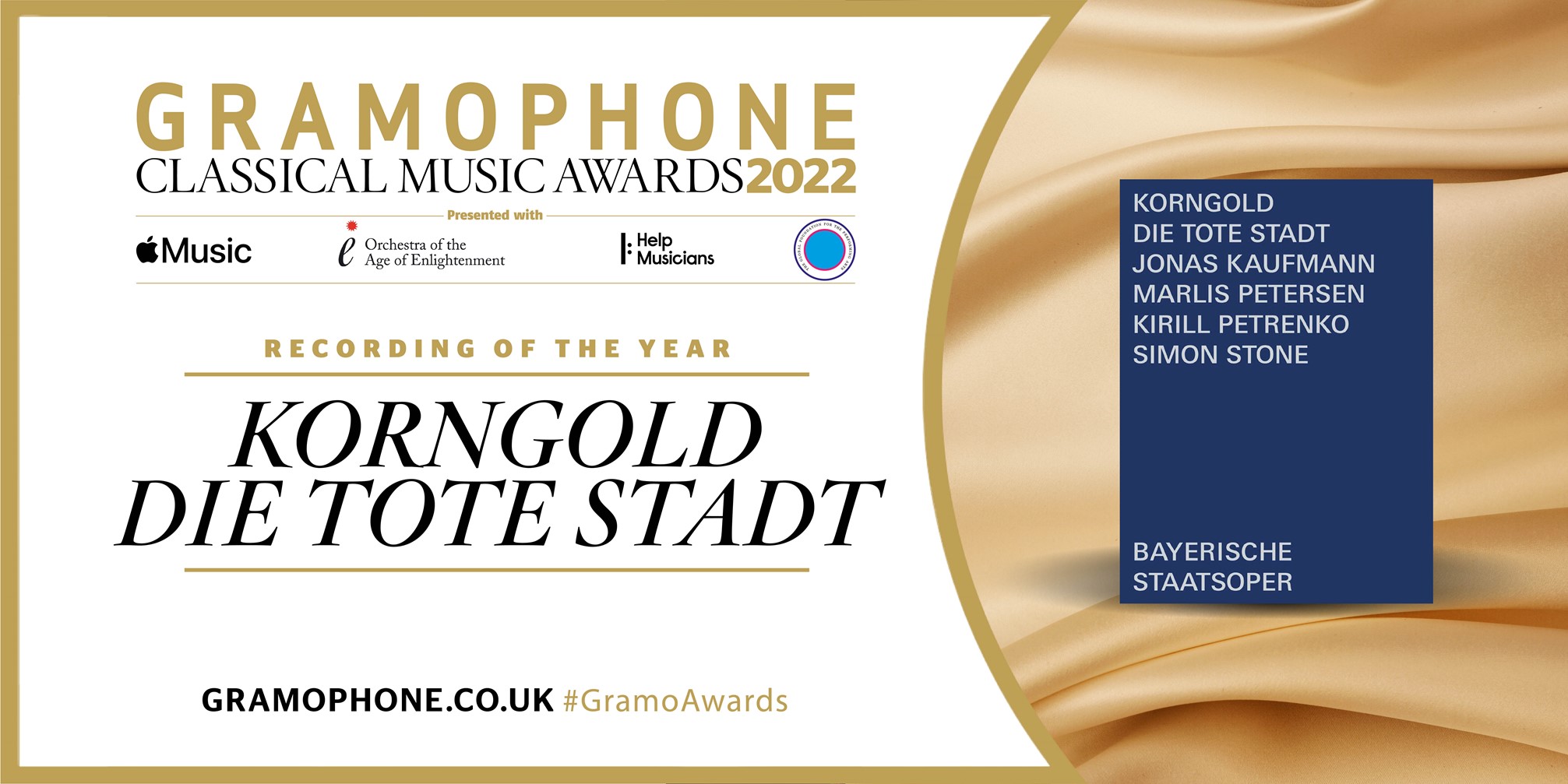Gramophone Opera Award & Recording of the Year 2022
Korngold Die tote Stadt
Jonas Kaufmann, Marlis Petersen, Andrzej Filończyk, Jennifer Johnston, Mirjam Mesak, Corinna Scheurle, Manuel Günther, Dean Power; Choruses of the Bavarian State Opera; Bavarian State Orchestra / Kirill Petrenko
BSO Recordings
As Simon Stone’s production of Die tote Stadt opens, Brigitta and Frank are peering through the windows of Paul’s house in Bruges. A very cold, very modern-looking house it is, too: one of those boxy low-rise apartments that you see on outlying housing estates while travelling into a major European city. But as Paul returns and pulls dust-sheets from his furniture, we begin to glimpse the outlines of his former life. Arthouse cinema posters, retro-chic furniture – evidence of a taste for things past that had presumably been a shared pleasure with his dead wife but which has spiralled, in her absence and his loneliness, into a troubling but wholly understandable obsession.
In short, while Stone’s updated setting might upset purists, there’s a depth and emotional intelligence to this staging that disarmed my initial resistance, and which, by the time it reached the apparition scene at the end Act 1, had me (and this almost never happens outside the theatre) in tears. Marie appears as Paul last saw her, clearly in the final stages of cancer; an idea that makes absolute sense of his veneration of her hairpiece after her death, and draws singing and acting of almost unbearable tenderness and poignancy from both Jonas Kaufmann and Marlis Petersen.
‘Their ‘Glück, das mir verblieb’ is one for the ages, as Kaufmann goes to pieces and Petersen quietly reaches for his hand’
Set against moments like that, the visual absence of the still waters and tolling bells that shimmer and resound through Korngold’s score ceases to register – though there’s nothing in Ralph Myers’s designs to suggest that this isn’t the ‘dead city’ of Bruges, just not the picture-postcard bit. It’s a strikingly realistic updating, faithful to the spirit and (mostly) the letter of the score. The one major departure comes in Act 3’s religious procession: a vision of singing schoolchildren and Magritte-like figures in bowler hats. But then, this is part of a dream sequence (signalled by a David Lynch-like flickering of the lights), and it’s true to what we’ve seen of Paul’s imaginative world. The way that Stone, Myers and the lighting designer Roland Edrich blur hallucination and reality throughout Act 2 is highly effective, and video director Myriam Hoyer steps lightly around the revolving set design, which colleagues who were present tell me was a distracting element in the theatre.
The central performances, meanwhile, are magnificent, with Kaufmann giving a detailed, believably frayed portrayal of a man struggling to hold on to his dignity as his life unravels. The textured darkness of his lower register conveys pain just as convincingly as his high notes soar. Petersen’s performance is, if anything, even more compelling. She’s a multi-layered Marietta, with countless vocal inflections and small gestures revealing an underlying tenderness and sympathy even at her most facetious, before transforming voice and persona into a radiant, ravaged vision of Marie in that brief but devastating Act 1 apparition. In Act 3’s climactic duet she unleashes a vocal ardour that all but overtops Kaufmann – which, given that this is one of the finest performances I’ve seen from him, live or on disc, is saying something. Their ‘Glück, das mir verblieb’ is one for the ages, as Kaufmann goes to pieces and Petersen quietly reaches for his hand.
The other roles are just as persuasive. Jennifer Johnston’s Brigitta, in particular, is warmly compassionate and Andrzej Filończyk (as Fritz) sings his Act 2 waltz song with style and a hint of irony, his face painted like Heath Ledger’s Joker (the cheerful chaos of the players’ digs is vividly evoked – the posters on their walls are for Hollywood movies, whereas Paul prefers Antonioni and Godard). Petrenko, in the pit, has an absolute command of texture and tension. His Bavarian orchestra can deliver lushness without limits, but Petrenko knows precisely when to probe and when to let Korngold’s tuned percussion show its teeth. He finds unsuspected shadows and subtleties in the lower reaches of the score, making unarguable sense of the paradox (still mind-boggling after a century) that a 23-year-old composer could create one of opera’s most affecting studies of grief, and do so in music of such life-affirming inspiration and colour. QED: on every level, a glorious achievement. Richard Bratby
Gramophone Awards 2022 – The Winners
Select an Award-winner below to read full reviews of each of the winning albums and expert insights from our writers.
Recording Categories
Opera & Recording of the Year
Korngold: Die tote Stadt (Sols; Bayerisches Staatsorchester / Kirill Petrenko)
Instrumental
Ysaÿe: Six Solo Violin Sonatas (James Ehnes)
Early Music
Josquin: ‘Baisiez Moy’ (Thélème / Jean-Christophe Groffe)
Orchestral
Mahler: Symphony No 7 (Bayerisches Staatsorchester / Kirill Petrenko)
Concerto
Piano
Beethoven: Diabelli Variations (Mitsuko Uchida)
Concept Album
Enargeia (Emily D'Angelo; Das Freie Orchester Berlin / Jarkko Riihimäki)
Contemporary
Chamber
’Round Midnight (Quatuor Ebène; Antoine Tamestit; Nicolas Altstaedt)
Choral
JS Bach: St Matthew Passion (Sols; Pygmalion / Raphaël Pichon)
Song
Rachmaninov: Songs – ‘Dissonance’ (Asmik Grigorian; Lukas Geniušas)
Voice & Ensemble
‘BariTenor’ (Michael Spyres; Strasbourg Philharmonic Orchestra / Marko Letonja)
Spatial Audio
Ravel: Orchestral Works (Sinfonia of London / John Wilson)
Special Awards
Label of the Year
Artist of the Year
Young Artist of the Year
Special Achievement
Mozart Momentum (Leif Ove Andsnes; Mahler Chamber Orchestra)
Lifetime Achievement
Orchestra of the Year

Gramophone Digital Club
- Digital Edition
- Digital Archive
- Reviews Database
- Full website access
From £8.75 / month
Subscribe
Gramophone Full Club
- Print Edition
- Digital Edition
- Digital Archive
- Reviews Database
- Full website access
From £11.00 / month
Subscribe
If you are a library, university or other organisation that would be interested in an institutional subscription to Gramophone please click here for further information.





